- Home
- Theodore Taylor
The Cay Page 2
The Cay Read online
Page 2
Then a day or two later, my father took me into the Schottegat where they were completing the loading of the S.S. Empire Tern, a big British tanker. She had machine guns fore and aft, one of the few armed ships in the harbor.
Although the trade wind was blowing, the smell of gas and oil lay heavy over the Schottegat. Other empty tankers were there, high out of the water, awaiting orders to sail once they had cargoes. The men on them were leaning over the rail watching all the activity on the Empire Tern.
I looked on as the thick hoses that were attached to her quivered when the gasoline was pumped into her tanks. The fumes shimmered in the air, and one by one, they “topped” her tanks, loading them right to the brim and securing them for sea. No one said very much. With all that aviation gasoline around, it was dangerous.
Then in the afternoon, we went to Punda and stood near the pontoon bridge as she steamed slowly down St. Anna Bay. Many others had come to watch, too, even the governor, and we all cheered as she passed, setting out on her lonely voyage to England. There, she would help refuel the Royal Air Force.
The sailors on the Empire Tern, which was painted a dull white but had rust streaks all over her, waved back at us and held up their fingers in a V-for-victory sign.
We watched until the pilot boat, having picked up the harbor pilot from the Empire Tern, began to race back to Willemstad. Just as we were ready to go, there was an explosion and we looked toward the sea. The Empire Tern had vanished in a wall of red flames, and black smoke was beginning to boil into the sky.
Someone screamed, “There it is.” We looked off to one side of the flames, about a mile away, and saw a black shape in the water, very low. It was a German submarine, surfaced now to watch the ship die.
A tug and several small motorboats headed out toward the Tern, but it was useless. Some of the women cried at the sight of her, and I saw men, my father included, with tears in their eyes. It didn’t seem possible that only a few hours before I had been standing on her deck. I was no longer excited about the war; I had begun to understand that it meant death and destruction.
That same night, my mother told my father, “I’m taking Phillip back to Norfolk.” I knew she’d made up her mind.
He was tired and disheartened over what had happened to the Empire Tern. He did not say much. But I do remember him saying, “Grace, I think you are making a mistake. You are both quite safe here in Scharloo.” I wondered why he didn’t simply order her to stay. But he wasn’t that kind of a man.
The sunny days and dark, still nights passed slowly during March. The ships had begun to sail again, defying the submarines. Some were lost. Henrik and I often went down to Punda to watch them go out, hoping that they would be safe.
Neither my father nor my mother talked very much about us leaving. I thought that when two American destroyers arrived, along with the Dutch cruiser Van Kingsbergen, to protect the lake tankers, Mother would change her mind. But it only made her more nervous.
Then one day in early April, she said, “Your father has finally secured passage for us, so today will be your last day in school here, Phillip. We’ll start packing tomorrow, and on Friday, we leave aboard a ship for Miami. Then we’ll take the train to Norfolk.”
Suddenly, I felt hollow inside. Then I became angry and accused her of being a coward. She told me to go off to school. I said I hated her.
All that day in school, I tried to think of what I could do. I thought about going somewhere and hiding until the ship had sailed, but on an island the size of Curaçao, there is no place to hide. Also, I knew it would cause my father trouble.
That night when he got home, I told him I wanted to stay with him. He smiled and put his long, thin arm around my shoulder. He said, “No, Phillip, I think it is best that you go with your mother. At a time like this, I can’t be at home very much.”
His voice seemed sad, although he was trying to be cheerful. He told me how wonderful it would be to return to the United States; how many things I had missed while we were on the island. I couldn’t think of one.
Then I talked to my mother about staying on in Willemstad, and she became very upset with both of us. She said that we didn’t love her and began to cry.
My father finally ended it by saying, “Phillip, the decision is made. You’ll leave Friday with your mother.”
So I packed, with her help, and said good-by to Henrik van Boven and the other boys. I told them we’d be gone just a short time; that we were going to visit my grandparents, my mother’s parents, in Norfolk. But I had the feeling that it might be a very long time before I saw Curaçao and my father again.
Early Friday morning, we boarded the S.S. Hato in St. Anna Channel. She was a small Dutch freighter with a high bow and stern, and a bridge house in the middle between two well decks. I had seen her often in St. Anna Bay. Usually, she ran between Willemstad, Aruba, and Panama. She had a long stack and always puffed thick, black smoke.
In our cabin, which was on the starboard side and opened out to the boat deck, my father said, “Well, you can rest easy, Phillip. The Germans would never waste a torpedo on this old tub.” Yet I saw him looking over the lifeboats. Then he inspected the fire hoses on the boat deck. I knew he was worried.
There were eight other passengers aboard, and they were all saying good-by to their relatives just as we were saying good-by to my father. In the tradition, people brought flowers and wine. It was almost like sailing in the days before the war, they told me.
Father was smiling and very gay but when the Hato’s whistle blasted out three times, meaning it was time to go, he said good-by to us between clenched teeth. I clung to him for a long time. Finally, he said, “Take good care of your mother.”
I said I would.
We sailed down St. Anna Bay, and the Queen Emma bridge parted for us. Through watery eyes, I saw the fort and the old buildings of Punda and Otrabanda. Native schooners were beating in from the sea.
Then my mother pointed. I saw a tall man standing on the wall of Fort Amsterdam, waving at us. I knew it was my father. I’ll never forget that tall, lonely figure standing on the sea wall.
The S.S. Hato took her first bite of open sea and began to pitch gently. We turned toward Panama, as we had to make a call there before proceeding to Miami. Down on the well decks, fore and aft, were four massive pumps that had to be delivered to Colón, the port at the Atlantic entrance to the Panama Canal.
I stayed out on deck for a long time, sitting by the lifeboat, looking back at Curaçao, feeling lonely and sad.
Finally my mother said, “Come inside now.”
CHAPTER
Three
WE WERE TORPEDOED at about three o’clock in the morning on April 6, 1942, two days after leaving Panama.
I was thrown from the top bunk and suddenly found myself on my hands and knees on the deck. We could hear the ship’s whistle blowing constantly, and there were sounds of metal wrenching and much shouting. The whole ship was shuddering. It felt as though we’d stopped and were dead in the water.
My mother was very calm, not at all like she was at home. She talked quietly while she got dressed, telling me to tie my shoes, and be certain to carry my wool sweater, and to put on my leather jacket. Her hands were not shaking.
She helped me put on my life jacket, then put hers on, saying, “Now, remember everything that we were told about abandoning ship.” The officers had held drills every day.
As she was speaking, there was another violent explosion. We were thrown against the cabin door, which the steward had warned us not to lock because it might become jammed. We pushed it open and went out to the boat deck, which was already beginning to tilt.
Everything was bright red, and there were great crackling noises. The entire afterpart of the ship was on fire, and sailors were launching the lifeboat that was on our deck. Steam lines had broken, and the steam was hissing out. Heat from the fire washed over us.
When the lifeboat had been swung out, the captain came down from th
e bridge. He was a small, wiry white-haired man and was acting the way I’d been told captains should act. He stood by the lifeboat in the fire’s glow, very alert, giving orders to the crew. He was carrying a brief case and a navigation instrument I knew to be a sextant. On the other side of the ship, another lifeboat was being launched.
Near us, two sailors with axes chopped at lines, and two big life rafts plunged toward the water, which looked black except for pools of fire from burning fuel oil.
The captain shouted, “Get a move on! Passengers into the boats!” Tins of lubricating oil in the afterholds had ignited and were exploding, but the ones forward had not been exposed to the fire.
A sailor grabbed my mother’s hand and helped her in, and then I felt myself being passed into the hands of a sailor on the boat. The other passengers were helped in, and someone yelled, “Lower away.” At that moment, the Hato lurched heavily and something happened to the boat falls.
The bow tilted downward, and the next thing I knew we were all in the water. I saw my mother near me and yelled to her. Then something hit me from above.
A long time later (four hours I was told), I opened my eyes to see blue sky above. It moved back and forth, and I could hear the slap of water. I had a terrible pain in my head. I closed my eyes again, thinking maybe I was dreaming. Then a voice said, “Young bahss, how are you feelin’?”
I turned my head.
I saw a huge, very old Negro sitting on the raft near me. He was ugly. His nose was flat and his face was broad; his head was a mass of wiry gray hair. For a moment, I could not figure out where I was or who he was. Then I remembered seeing him working with the deck gang of the Hato.
I looked around for my mother, but there was no one else on the raft. Just this huge Negro, myself, and a big black and gray cat that was licking his haunches.
The Negro said, “You ’ad a mos’ terrible crack on d’ead, bahss. A strong-back glanc’ offen your ’ead, an’ I harl you board dis raff.”
He crawled over toward me. His face couldn’t have been blacker, or his teeth whiter. They made an alabaster trench in his mouth, and his pink-purple lips peeled back over them like the meat of a conch shell. He had a big welt, like a scar, on his left cheek. I knew he was West Indian. I had seen many of them in Willemstad, but he was the biggest one I’d ever seen.
I sat up, asking, “Where are we? Where is my mother?”
The Negro shook his head with a frown. “I true believe your mut-thur is safe an’ soun’ on a raff like dis. Or mebbe dey harl ’er into d’boat. I true believe dat.”
Then he smiled at me, his face becoming less terrifying. “As to our veree location, I mus’ guess we are somewhar roun’ d’cays, somewhar mebbe fifteen latitude an’ eighty long. We should ’ave pass dem til’ dat mos’ treacherous torpedo split d’veree hull. Two minute downg, at d’mos’.”
I looked all around us. There was nothing but blue sea with occasional patches of orange-brown seaweed. No sight of the Hato, or other rafts, or boats. Just the sea and a few birds that wheeled over it. That lonely sea, and the sharp pains in my head, and the knowledge that I was here alone with a black man instead of my mother made me break into tears.
Finally the black man said, looking at me from bloodshot eyes, “Now, young bahss, I mos’ feel like dat my own self, Timothy, but ’twould be of no particular use to do dat, eh?” His voice was rich calypso, soft and musical, the words rubbing off like velvet.
I felt a little better, but my head ached fiercely.
He nodded toward the cat. “Dis is Stew, d’cook’s cat. He climb on d’raff, an’ I ’ad no heart to trow ’im off.” Stew was still busy licking. “ ’E got oi-ll all ovah hisself from d’wattah.”
I looked closer at the black man. He was extremely old yet he seemed powerful. Muscles rippled over the ebony of his arms and around his shoulders. His chest was thick and his neck was the size of a small tree trunk. I looked at his hands and feet. The skin was alligatored and cracked, tough from age and walking barefoot on the hot decks of schooners and freighters.
He saw me examining him and said gently, “Put your ’ead back downg, young bahss, an’ rest awhile longer. Do not look direct at d’sun. ’Tis too powerful.”
I felt seasick and crawled to the side to vomit. He came up beside me, holding my head in his great clamshell hands. It didn’t matter, at that moment, that he was black and ugly. He murmured, “Dis be good, dis be good.”
When it was over, he helped me back to the center of the raft, saying, “ ’Tis mos’ natural for you to do dis. ’Tis d’shock o’ havin’ all dis mos’ terrible ting ’appen.”
I then watched as he used his powerful arms and hands to rip up boards from the outside edges of the raft. He pounded them back together on cleats, forming two triangles; then he jammed the bases into slots between the raft boards. He stripped off his shirt and his pants, then demanded mine. I don’t know what happened to my leather jacket or my sweater. But soon, we had a flimsy shelter from the burning sun.
Crawling under it to sprawl beside me, he said, “We ’ave rare good luck, young bahss. D’wattah kag did not bus’ when d’raff was launch, an’ we ’ave a few biscuit, some choclade, an’ d’matches in d’tin is dry. So we ’ave rare good luck.” He grinned at me then.
I was thinking that our luck wasn’t so good. I was thinking about my mother on another boat or raft, not knowing I was all right. I was thinking about my father back in Willemstad. It was terrible not to be able to tell him where I was. He’d have boats and planes out within hours.
I guess the big Negro saw the look on my face. He said, “Do not be despair, young bahss. Someone will fin’ us. Many schooner go by dis way, an’ dis also be d’ship track to Jamaica, an’ on.”
After a bit, lulled by the bobbing of the raft and by the soft, pleasant sounds of the sea against the oil barrel floats, I went to sleep again. I was very tired and my head still ached. The piece of timber must have struck a glancing blow on the left side.
When I next awakened, it was late afternoon. The sun had edged down and the breeze across us was cool. But I felt very hot and the pain had not gone away. The Negro was sitting with his back toward me, humming something in calypso. His back was a great wall of black flesh, and I saw a cruel scar on one shoulder.
I asked, “What is your name?”
Hearing my voice, he turned with a wide grin. “Ah, you are back wit’ me. It ’as been lonesome dese veree hours.”
I repeated, “What is your name?”
“My own self? Timothy!”
“Your last name?”
He laughed, “I ’ave but one name. ’Tis Timothy.”
“Mine is Phillip Enright, Timothy.” My father had always taught me to address anyone I took to be an adult as “mister,” but Timothy didn’t seem to be a mister. Besides, he was black.
He said, “I knew a Phillip who feesh out of St. Jawn, but an outrageous mahn he was.” He laughed deep inside himself.
I asked him for a drink of water.
He nodded agreeably, saying, “D’sun do parch.” He lifted a hinged section of the raft flooring and drew out the keg, which was about two feet long. There was a tin cup lashed to it. Careful not to spill a drop, he said, “ ’Tis best to ’ave only an outrageous smahl amount. Jus’ enough to wet d’tongue.”
“Why?” I asked. “That is a large keg.”
He scanned the barren sea and then looked back at me, his old eyes growing remote. “D’large kag ’ave a way o’ losin’ its veree size.”
“You said we would be picked up soon,” I reminded him.
“Ah, yes,” he said instantly, “but we mus’ be wise ’bout what we ’ave.”
I drank the tiny amount of water he’d poured out and asked for more. He regarded me silently a moment, then said, his eyes squinting, “A veree lil’ more, young bahss.”
My lips were parched and my throat was dry. I wanted a whole cup. “Please fill it up,” I said.
Timothy poured only
a few drops into the bottom.
“That isn’t enough,” I complained. I felt I could drink three cups of it. But he pressed the wooden stopper firmly back into the keg, ignoring me.
I said, “I must have water, Timothy. I’m very hot.”
Without answering, he opened the trap in the raft and secured the keg again. It was then that I began to learn what a stubborn old man he could be. I began to dislike Timothy.
“Young bahss,” he said, coming back under the shelter, “mebbe before d’night, a schooner will pass dis way, an’ if dat ’appens, you may drink d’whole kag. Mebbe d’schooner will not pass dis way, so we mus’ make our wattah last.”
I said defiantly, “A schooner will find us. And my father has ships out looking for us.”
Without even glancing at me, he answered, “True, young bahss.” Then he closed his eyes and would not speak to me any more. He just sprawled out, a mound of silent black flesh.
I couldn’t hold the tears back. I’m sure he heard me, but he didn’t move a muscle of his face. Neither did he look up when I crawled out from under the shelter to get as far away from him as I could. I stayed on the edge of the raft for a long time, thinking about home and rubbing Stew Cat’s back.
Although I hadn’t thought so before, I was now beginning to believe that my mother was right. She didn’t like them. She didn’t like it when Henrik and I would go down to St. Anna Bay and play near the schooners. But it was always fun. The black people would laugh at us and toss us bananas or papayas.
She’d say, when she knew where we’d been, “They are not the same as you, Phillip. They are different and they live differently. That’s the way it must be.” Henrik, who’d grown up in Curaçao with them, couldn’t understand why my mother felt this way.
I yelled over at him, “You’re saving all the water for yourself.”
I don’t think he was asleep, but he didn’t answer.

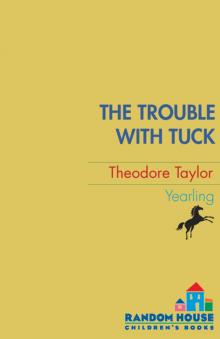 The Trouble With Tuck the Trouble With Tuck
The Trouble With Tuck the Trouble With Tuck The Bomb
The Bomb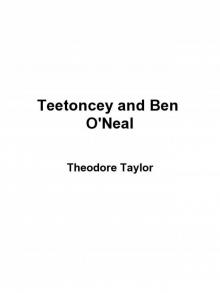 Teetoncey and Ben O'Neal
Teetoncey and Ben O'Neal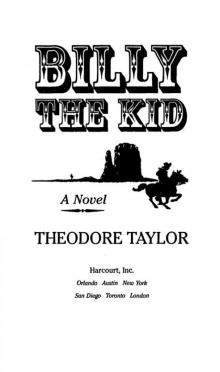 Billy the Kid
Billy the Kid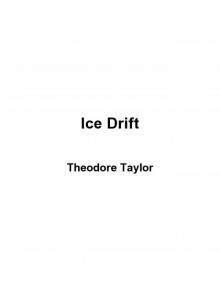 Ice Drift
Ice Drift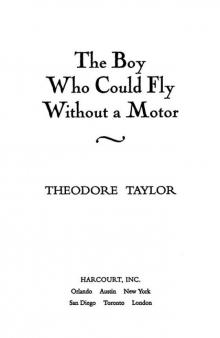 The Boy Who Could Fly Without a Motor
The Boy Who Could Fly Without a Motor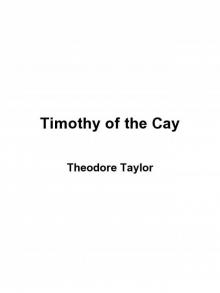 Timothy of the Cay
Timothy of the Cay The Cay
The Cay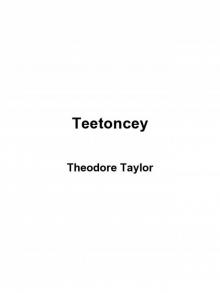 Teetoncey
Teetoncey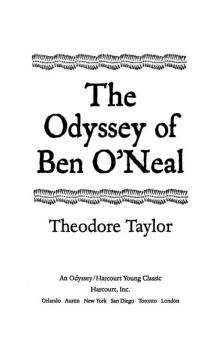 Into the Wind: The Odyssey of Ben O'Neal
Into the Wind: The Odyssey of Ben O'Neal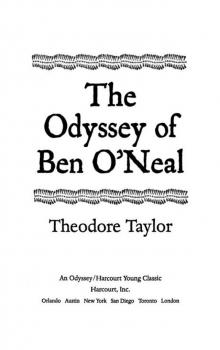 The Odyssey of Ben O'Neal
The Odyssey of Ben O'Neal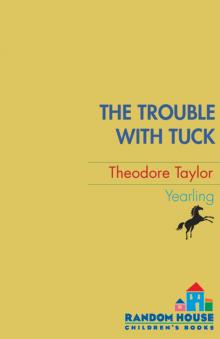 The Trouble with Tuck
The Trouble with Tuck